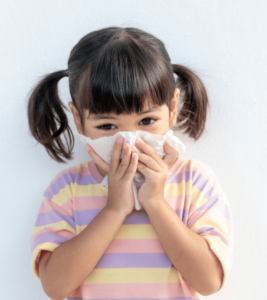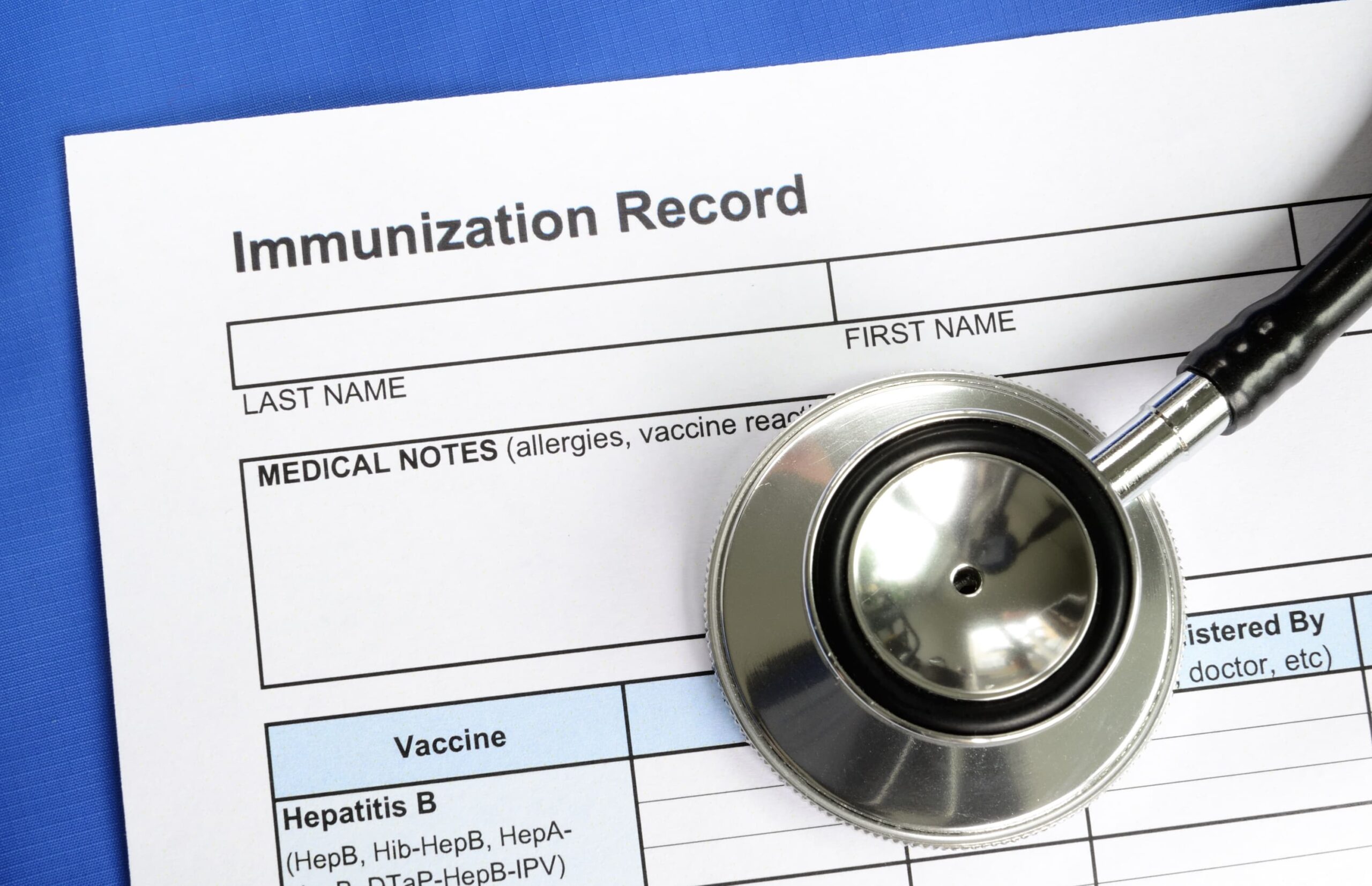As parents, it’s natural to worry about how often our children get sick. Understanding the typical frequency of illnesses at different ages can help us feel at ease and better understand what to expect. This article provides a look at why children get sick, the development of the immune system, and what is considered normal in terms of illness frequency and severity, as well as shares some insight on how we can support our children’s immune health.
Average Sickness Frequency by Age
Many parents express feeling worried about their young children getting sick too often. However, when I explain that frequent illness is a normal part of childhood, they usually feel more at ease. Many are surprised to learn that it’s quite common for kids to fall ill several times a year. Below are some estimates and averages on sickness frequency as well as observations from my years of clinical experience treating children and my experience with my own children.
Babies (0-12 months)
Reports on illness frequency in babies vary quite a bit, but most reports show that babies and young children can get sick anywhere from 6 to 12 times per year (1-5). This is a large range, and it is important to understand that this estimate includes all types of illness – from gastro-intestinal illness to the common cold. Data shows that infants with older siblings, and infants in daycare tend to get sick more frequently than babies who stay home and don’t have siblings (4,6), so if you are a stay-at-home parent to an infant who does not have siblings you may find that your baby doesn’t get sick as often as these estimates show – which is okay!
Preschoolers (1-5 years)
Preschool-aged children typically continue to experience a large amount of illness, especially if they are just starting preschool at which point it is considered normal to experience 6 to 10 illnesses annually (1-3), or about one illness per month (6) – with the data showing that young children in a daycare setting can be symptomatic for about 5 days per month on average (6).
 A city in Finland recorded yearly sick days for children up to 3 years of age in daycare and found that the average kid missed 24 days per year for illness or 2 days per month on average (7). The preschool years are a time of increased exposure to other children in daycare, preschool, or other social settings and this tends to lead to frequent colds and other infections during this time. This is something I see in my practice – and it’s part of why I developed my line of herbal immune remedies for kids. Research shows that the increase in illness associated with a daycare/preschool setting is most prominent during the first six months of attendance (6), and sickness frequency goes down again significantly after attending a care setting for more than two years (6).
A city in Finland recorded yearly sick days for children up to 3 years of age in daycare and found that the average kid missed 24 days per year for illness or 2 days per month on average (7). The preschool years are a time of increased exposure to other children in daycare, preschool, or other social settings and this tends to lead to frequent colds and other infections during this time. This is something I see in my practice – and it’s part of why I developed my line of herbal immune remedies for kids. Research shows that the increase in illness associated with a daycare/preschool setting is most prominent during the first six months of attendance (6), and sickness frequency goes down again significantly after attending a care setting for more than two years (6).
School-Aged Children (6-12 years)
School-aged children still tend to get sick around 4 to 8 times per year (4,6). It is common for kids to start getting sick a lot less starting around age 6 (4). It is also noteworthy that children who attended daycare as babies and toddlers tend to get sick less frequently than their peers once they are school-aged (8). By the time your child enters grade school, their immune system has gotten quite a bit of practice and is stronger, but school environments still provide ample opportunities for germ sharing.
Teenagers (13-18 years)
Teenagers tend to fall ill with about the same frequency as adults (6), typically up to 4 to 6 times per year (9). Their more mature immune systems and better hygiene practices result in fewer illnesses compared to younger children.
Immune System Development
It is normal for sickness frequency to decrease as children age. This is, in part, because the immune system evolves significantly from infancy through adolescence.
Newborns and Infants
Newborns have an underdeveloped immune system that is still learning to recognize and combat pathogens (10). Newborns are born with antibodies passed from their mothers during pregnancy and, if breastfed, through breast milk (10). These antibodies provide initial protection against infections (10). Research shows that breastfed babies tend to get sick less often than formula-fed babies due to the presence of maternal antibodies in breast milk (11).
Babies born via vaginal birth are exposed to beneficial bacteria from the mother’s birth canal, which helps to populate their gut microbiome and strengthen their immune system (12). While babies born by c-section miss out on this initial exposure, frequent skin-to-skin contact and breastfeeding can help compensate for this difference. It is noteworthy that premature infants are more susceptible to infection (13). This is because they forgo a crucial period of immune development that typically occurs in the later stages of pregnancy (13). For premature babies, it is important to support their immune health through practices like breastfeeding and skin-to-skin contact, as well as closely monitoring and managing their exposure to potential infections.
Toddlers and Preschoolers
As children grow, their immune systems become more adept at recognizing and fighting pathogens; however, this is also a time of increased interaction with other children in daycare, preschool, or other settings. This exposure to a variety of germs is an important part of the development of the immune system, which “learns” or adapts from this exposure and gradually becomes more robust (14).
School-Aged Children
It is common for school aged children to still get sick somewhat frequently; though by this age the frequency of illness is often notably less than during the preschool years (6). This is in part due to their maturing immune systems, as school aged children have already been exposed to many common pathogens and have developed specific antibodies (14). Also, by this age, many kids are more likely to follow good hygiene practices, including covering sneezes and effective handwashing, reducing the spread of germs and as such the frequency of illness.
Teenagers and Adults
The teenaged immune system is largely on par with that of adults. However, highschoolers tend to be in closer contact with their peers on a day to day basis compared to adults in the average workspace environment, so you may notice that your teen does tend to get sick slightly more often than you do.
Is “Normal” Optimal?
You may be wondering, although these frequencies of illness are considered normal, does that necessarily mean they are optimal? And that is a great question! I want to explain a little about why frequent illness during childhood is an integral part of immune system development, and why it’s not necessarily always better to get sick less frequently.
Childhood Illness & The Immune System
Illnesses during childhood play a role in developing a strong and resilient immune system (15). Here’s why:
Immune System Training
Each time a child gets sick, their immune system learns to recognize and fight off the pathogen responsible for the illness (15). This process helps build a memory bank of antibodies, making the immune system more efficient at responding to future infections. The immune system’s ability to remember and respond to specific pathogens is called adaptive immunity (15), and this is partly why older children and adults tend to get sick less often and recover more quickly (15).
 Interestingly, there is some evidence that early and frequent exposure to a range of pathogens helps maintain a balanced immune system, potentially reducing the risk of overreactions such as allergies and autoimmune diseases (16). There is even a study that shows that children who go to daycare as infants (and thus are exposed to more germs from a young age) are less likely to get ALL (acute lymphoblastic leukemia) in their lifetime (17). This is not to say that you need to go overboard and forego handwashing all together, but it is to say that normal exposure to social situations and refraining from over-sanitization may be supportive of long term immune health.
Interestingly, there is some evidence that early and frequent exposure to a range of pathogens helps maintain a balanced immune system, potentially reducing the risk of overreactions such as allergies and autoimmune diseases (16). There is even a study that shows that children who go to daycare as infants (and thus are exposed to more germs from a young age) are less likely to get ALL (acute lymphoblastic leukemia) in their lifetime (17). This is not to say that you need to go overboard and forego handwashing all together, but it is to say that normal exposure to social situations and refraining from over-sanitization may be supportive of long term immune health.
Another important part of a healthy immune system is a robust and diverse microbiome. To learn more, read: 12 Science-Backed Ways Probiotics Benefit The Immune System
When Should I Worry About My Child’s Frequent Illness?
Despite exposure to childhood illness being a way in which our immune systems mature and develop, there are situations where the frequency or severity of illness may warrant further investigation.
Too Much Sickness or Taking Too Long To Recover
If your child is experiencing more than the average number of illnesses, recurrent infections that are severe, or frequently not recovering from illness within the expected timeframe, it may indicate an underlying immune deficiency or other health issues. Don’t hesitate to reach out to your child’s doctor for testing and personalized advice.
Too Little Sickness
While it might seem ideal, if a child never gets sick, it could suggest that either their immune system is not being adequately challenged due to a lack of exposure. This can lead to a weaker immune response later in life. If a child very rarely gets sick even when the rest of the household does and despite regular exposure to germs, there is potential that their immune system isn’t able to mount a strong enough immune reaction which leads to a lack of symptoms.
Supporting Your Child’s Immune System
The goal when it comes to supporting a child’s immune system is to fortify their immune system to allow it to perform at its best and to effectively deal with pathogens. A healthy immune system is able to mount effective and appropriate immune responses and recover from illness quickly and effectively. The best way to holistically support your child’s immune system is to focus on a healthy lifestyle, a nutrient dense diet, getting sufficient sleep, and to utilize supplementation as needed. Gut health also plays an important role in maintaining a strong immune system.
To learn more about supporting a healthy immune system, see: Important Immunity Terms To Know and Winter Immune Support For All Ages
Summary
It’s normal for children to experience frequent illnesses as their immune systems develop. Babies and preschoolers can get sick up to 6 to 12 times a year. School-aged children tend to get sick up to 6 to 8 times per year, and teenagers are on par with adults and can average 4 to 6 bouts of illness per year. Exposure to germs is how we “train” the immune system to recognize and combat pathogens, building a robust memory of antibodies. While frequent sickness is typical, excessive or prolonged illness may indicate underlying health issues, and parents should consult a healthcare provider if concerned. To support a child’s immune health, focus on a balanced diet, adequate sleep, regular physical activity, stress management, and good hygiene practices.
References:
- Oxford Academic. (2005). Colds in children. Paediatrics & Child Health, 10(8), 493–495. https://doi.org/10.1093/pch/10.8.493
- Heikkinen, T., & Järvinen, A. (2003). The common cold. The Lancet, 361(9351), 51–59. https://doi.org/10.1016/s0140-6736(03)12162-9
- American Academy of Pediatrics Council on Early Childhood. (n.d.). When to Keep Your Child Home from Child Care. HealthyChildren.org. https://www.healthychildren.org/English/family-life/work-and-child-care/Pages/when-to-keep-your-child-home-from-child-care.aspx
- Boston Children’s Hospital. (n.d.). Cold. Www.childrenshospital.org. https://www.childrenshospital.org/conditions/cold
- Schuez-Havupalo, L., Toivonen, L., Karppinen, S., Kaljonen, A., & Peltola, V. (2017). Daycare attendance and respiratory tract infections: a prospective birth cohort study. BMJ Open, 7(9), e014635. https://doi.org/10.1136/bmjopen-2016-014635
- Burkhart, D. M. (1999). Management of Acute Gastroenteritis in Children. American Family Physician, 60(9), 2555–2563. https://www.aafp.org/pubs/afp/issues/1999/1201/p2555.html
- Möttönen M, Uhari M. Absences for sickness among children in day care. Acta Paediatr. 1992 Nov;81(11):929-32. doi: 10.1111/j.1651-2227.1992.tb12138.x. PMID: 1467617.
- Ball, T. M., Holberg, C. J., Aldous, M. B., Martinez, F. D., & Wright, A. L. (2002). Influence of Attendance at Day Care on the Common Cold From Birth Through 13 Years of Age. Archives of Pediatrics & Adolescent Medicine, 156(2), 121–126. https://doi.org/10.1001/archpedi.156.2.121
- Worrall G. (2011). Common cold. Canadian family physician Medecin de famille canadien, 57(11), 1289–1290.
- Moraes-Pinto, M. I., Suano-Souza, F., & Aranda, C. S. (2021). Immune system: development and acquisition of immunological competence. Jornal de pediatria, 97 Suppl 1(Suppl 1), S59–S66. https://doi.org/10.1016/j.jped.2020.10.006
- Office of the Surgeon General (US); Centers for Disease Control and Prevention (US); Office on Women’s Health (US). (2011). The Surgeon General’s Call to Action to Support Breastfeeding. Rockville (MD). The Importance of Breastfeeding. https://www.ncbi.nlm.nih.gov/books/NBK52687/
- Coelho, G. D. P., Ayres, L. F. A., Barreto, D. S., Henriques, B. D., Prado, M. R. M. C., & Passos, C. M. D. (2021). Acquisition of microbiota according to the type of birth: an integrative review. Revista latino-americana de enfermagem, 29, e3446. https://doi.org/10.1590/1518.8345.4466.3446
- Collins, A., Weitkamp, J. H., & Wynn, J. L. (2018). Why are preterm newborns at increased risk of infection?. Archives of disease in childhood. Fetal and neonatal edition, 103(4), F391–F394. https://doi.org/10.1136/archdischild-2017-313595
- InformedHealth.org [Internet]. Cologne, Germany: Institute for Quality and Efficiency in Health Care (IQWiG); 2006-. In brief: The innate and adaptive immune systems. [Updated 2023 Aug 14]. https://www.ncbi.nlm.nih.gov/books/NBK279396/
- Simon, A. K., Hollander, G. A., & McMichael, A. (2015). Evolution of the immune system in humans from infancy to old age. Proceedings. Biological sciences, 282(1821), 20143085. https://doi.org/10.1098/rspb.2014.3085
- Okada, H., Kuhn, C., Feillet, H., & Bach, J. F. (2010). The ‘hygiene hypothesis’ for autoimmune and allergic diseases: an update. Clinical and experimental immunology, 160(1), 1–9. https://doi.org/10.1111/j.1365-2249.2010.04139.x
- Ma, X., Buffler, P. A., Selvin, S., Matthay, K. K., Wiencke, J. K., Wiemels, J. L., & Reynolds, P. (2002). Daycare attendance and risk of childhood acute lymphoblastic leukaemia. British journal of cancer, 86(9), 1419–1424. https://doi.org/10.1038/sj.bjc.6600274









7 Comments